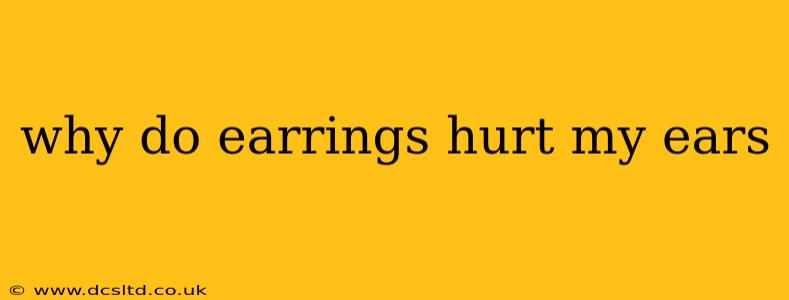Earring pain is a common problem, frustrating for those who love wearing earrings. It can range from a mild ache to sharp, throbbing discomfort, and understanding the cause is crucial for finding relief. This comprehensive guide explores the various reasons why earrings might hurt your ears, offering solutions and preventative measures.
What are the common causes of earlobe pain from earrings?
This is a frequent question, and the answer often lies in a combination of factors. The most common causes include:
-
Irritant Contact Dermatitis: This allergic reaction is triggered by the metal in your earrings, most commonly nickel. Nickel is found in many types of jewelry, even those labeled as "gold-plated," as the base metal is often nickel. The reaction manifests as itchy, red, inflamed skin around the piercing.
-
Infection: Bacteria can enter the piercing site through unclean earrings or improper aftercare, causing pain, swelling, redness, and possibly pus.
-
Improper Piercing Technique: If your piercing wasn't done properly, the tissue might not have healed correctly, leading to ongoing irritation and pain.
-
Earring Material: Besides nickel allergy, other metals can cause irritation in sensitive individuals. Consider exploring hypoallergenic options like sterling silver, titanium, or surgical stainless steel.
-
Heavy Earrings: The weight of heavy earrings can stretch or irritate the earlobe over time, resulting in pain and discomfort.
Why do my ears hurt after getting my ears pierced?
The initial pain after getting your ears pierced is expected, as it's a form of trauma to the tissue. However, lingering pain after the initial healing period (typically 6-8 weeks) suggests a problem. This pain could be due to:
-
Incomplete Healing: The piercing might not have fully healed, leaving the area vulnerable to irritation and infection.
-
Infection (again): This remains a significant possibility even weeks after piercing. Pay close attention to any signs of infection, including increased pain, swelling, redness, and pus.
-
Irritation from Earrings: The earrings themselves may be irritating the still-healing piercing. Consider switching to smaller, simpler earrings during the healing phase.
What if my ears hurt even when I'm not wearing earrings?
Pain in your ears without earrings indicates a possible underlying issue beyond simple irritation. This pain could stem from:
-
Keloids or Hypertrophic Scars: These raised, thick scars form around the piercing site and can be painful and unsightly.
-
Underlying Medical Conditions: In rare cases, ear pain can be linked to more significant medical issues. Consult a healthcare professional for a proper diagnosis if you experience persistent or unexplained ear pain.
How can I prevent earring pain?
Preventing ear pain involves careful earring selection and piercing aftercare:
-
Choose Hypoallergenic Materials: Opt for earrings made from hypoallergenic metals such as sterling silver, titanium, or surgical stainless steel.
-
Proper Piercing Technique: Ensure your piercing is done by a reputable and licensed professional using sterile equipment.
-
Thorough Aftercare: Follow your piercer's aftercare instructions carefully, including cleaning the piercing regularly and avoiding touching it unnecessarily.
-
Avoid Heavy Earrings: Stick to lighter earrings, especially during the healing phase, to reduce irritation.
-
Regular Cleaning: Clean your earrings before and after wearing them to minimize the buildup of bacteria and irritants.
When should I see a doctor about earring pain?
Seek medical attention if you experience:
- Severe pain: Intense, throbbing pain that doesn't improve with over-the-counter pain relievers.
- Signs of infection: Swelling, redness, pus, or fever.
- Persistent pain: Pain that lasts for more than a few days or weeks, even with appropriate aftercare.
Addressing earring pain requires understanding its root cause. By following these guidelines and seeking medical advice when necessary, you can keep your ears healthy and happy, and continue enjoying your favorite earrings without discomfort.
